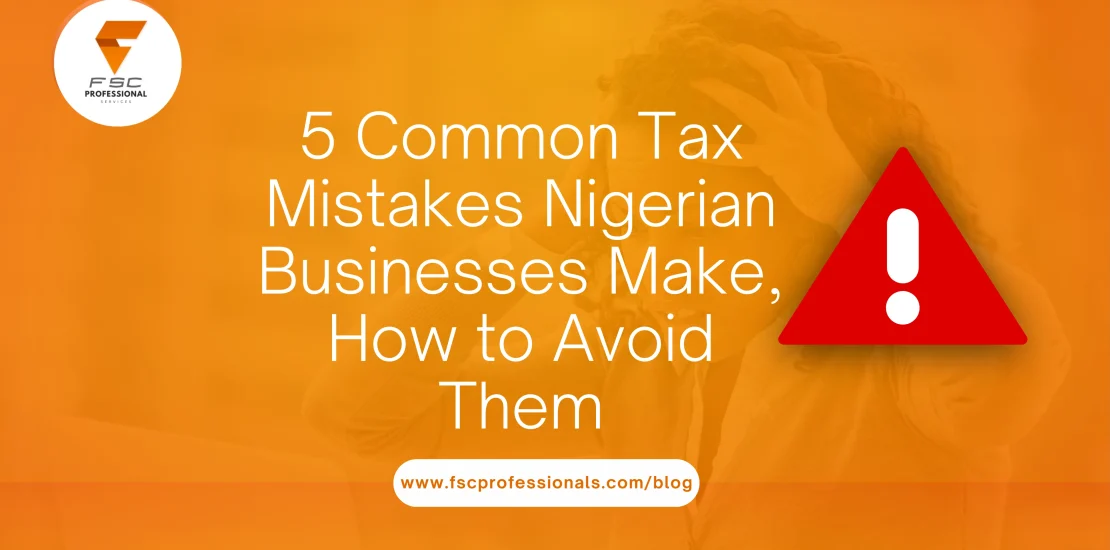- April 16, 2025
- Posted by: admin
- Category: Resources

5 Common Tax Mistakes Nigerian Businesses Make can result in serious financial and legal consequences. For entrepreneurs and SMEs in Nigeria, navigating the country’s complex tax landscape is essential for long-term success.
From late filings to poor record-keeping, these mistakes not only attract penalties but can also cripple business growth. With Nigeria’s tax authorities becoming more proactive and technology-driven, it’s more important than ever to stay compliant.
In this article, we examine the 5 common tax mistakes Nigerian businesses make, highlight the legal implications under the Personal Income Tax Act (PITA) and the Companies Income Tax Act (CITA), and provide practical ways to avoid them.
1. Failure to File Annual Tax Returns on Time
One of the 5 common tax mistakes Nigerian businesses make is failing to file annual returns within the legally prescribed deadlines.
Section 41 of the Personal Income Tax Act (2011, as amended) requires all taxable persons to file their income returns within 90 days of the start of the year (i.e., before March 31st).
Under CITA, companies must file their Companies Income Tax (CIT) returns within six months after their financial year-end.
Consequences:
- For companies: N25,000 penalty for the first month of default, N5,000 for each additional month.
- For individuals: N50,000 penalty for the first month, and N5,000 for each month thereafter.
- Increased audit risk from tax authorities.
Avoidance Tips:
- Schedule reminders for tax deadlines.
- Use platforms like FIRS TaxPro Max and LIRS eTax (for Lagos residents)
- Work with a tax advisor to manage timelines effectively.
2. Poor Record-Keeping
Another one of the 5 common tax mistakes Nigerian businesses make is inadequate or disorganised record-keeping.
Financial records are essential for proper tax computation, justification of deductions, and audit defence.
Consequences:
- Best of judgment assessments by FIRS or SIRS.
- Disallowed tax deductions due to a lack of evidence.
Avoidance Tips:
- Implement accounting software.
- Hire or outsource to professional bookkeepers.
- Retain records for a minimum of six years.
You can Also Check This Out:
3. Neglecting VAT and WHT Obligations
A critical mistake among the 5 common tax mistakes Nigerian businesses make is ignoring Value Added Tax (VAT) and Withholding Tax (WHT) responsibilities.
Businesses must collect and remit VAT at 7.5% and appropriately deduct WHT for qualifying transactions.
Consequences:
- Fines and interest on late remittances.
- Business closure for persistent non-compliance.
Avoidance Tips:
- Register for VAT and obtain a Tax Identification Number (TIN).
- File monthly VAT and WHT returns.
- Issue VAT-compliant invoices.
4. Mismanaging PAYE and Employee Tax Deductions
Among the 5 common tax mistakes Nigerian businesses make is the incorrect classification of employees and the failure to remit Pay-As-You-Earn (PAYE) taxes. Employers must deduct and remit personal income tax for their employees monthly.
Consequences:
- Penalties and interest for late remittance.
- Liability for back taxes.
- Reputational risks.
Avoidance Tips:
- Differentiate correctly between employees and contractors.
- Register with the State Internal Revenue Service.
- Remit deductions by the 10th of the following month.
5. Ignoring Tax Reliefs, Incentives, and Allowable Deductions
One of the 5 common tax mistakes Nigerian businesses make is failing to take advantage of legally allowed deductions and incentives. The CITA and PITA provide for several tax reliefs that can reduce tax liabilities.
Consequences:
- Overpayment of taxes.
- Missed opportunities for tax holidays or rebates.
Avoidance Tips:
- Consult a tax advisor to explore applicable incentives.
- Track eligible business expenses.
- Reassess your business structure for efficiency.
Bonus Tip: Be Proactive About Tax Compliance
Don’t wait for an audit notice before getting your books in order. With tax authorities leveraging data analytics, any inconsistency could trigger a tax audit.
Conclusion
Understanding the 5 common tax mistakes Nigerian businesses make is the first step toward achieving full compliance and minimizing liabilities. From late filings to ignoring deductions, each misstep can cost your business valuable time and money.
At FSC Professionals, we provide expert tax planning and advisory services to help your business stay on track. Don’t let avoidable tax errors hold you back.
Ready to get compliant and grow with confidence? Contact FSC Professionals today.
